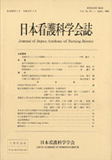Japanese
English
- 販売していません
- Abstract 文献概要
- 参考文献 Reference
要旨
脳卒中発作のために公立の総合病院に入院し,運動機能障害のためリハビリテーション治療を受けていた脳卒中後遺症をもつ患者94人の,退院・転院後6ヵ月時点での自宅復帰に関連する要因を明らかにするため,ロジスティック回帰分析によって分析した結果,以下の知見が得られた.
1)自宅復帰に関連の強い要因は,①70歳未満,②同居者数が3人以上,③退院時BI点が高い,④入院日数が短いの4項目であり,これら4つの要因がすべて充たされた場合,自宅復帰の可能性が非常に高くなる.
2)しかし,以上の4要因をすべて充たしてなくても,ADLが高い場合には,独居でも自宅復帰の可能性は高くなる.
3)さらに,退院時BI点が低くても,年齢が若く,入院日数が短い場合には自宅復帰の可能性は高い.
Abstract
The Focus was on stroke patients who returned home and their communities. 94 hemiplegia cases in rehabilitation units of acute care general hospitals were studied to identify factors affecting a return home six months after discharge. Logistic Regression Analysis was used. The main results were as follows:
1. Those, who satisfied with following four factors, had remarkable possibility of stroke patients to return home six months after discharge; firstly, aged 69 years or younger; secondarily, had 3 or more family members; thirdly, had higher Barthel scores; and fourthly, had a shorter length of hospitalization.
2. Those, who had higher Barthel scores, had a possibility to return home, even if they live alone and were not satisfied with all four factors.
3. In addition, there was also the possibility for some to return home when aged 69 years or younger and had a shorter length of hospitalization as factors affecting ADL, even though they had lower discharge Barthel scores.
Copyright © 1998, Japan Academy of Nursing Science. All rights reserved.


